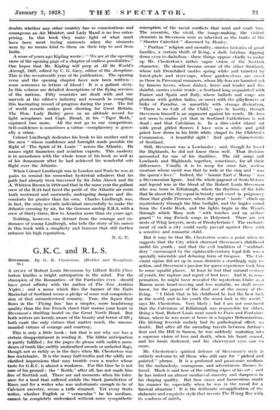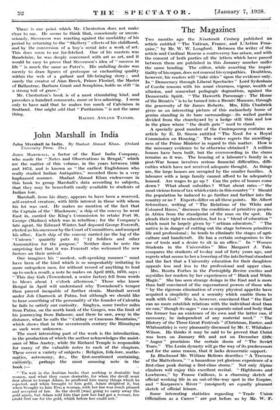G. K. C. and R. L. S.
A sitnv of Robert Louis Stevenson by Gilbert Keith Ches- terton kindles a bright anticipation in the mind. For the champion of the Romantics—of the Fantastics even—should have great affinity with the author of The New Arabian Nights ; and a name which flies the banner of the Earls Marischal of Scotland seems a pledge of some real comprehen- sion of that misunderstood country. True, the liquor that flows in the ` Flying Inn' has a simpler, more headstrong quality than the fine French claret that warms your heart in Stevenson's thrilling hostel on the Great North Road. But both writers are keenly aware of the beauty and terror of life ; both exalt the only virtues that matter much, the uncom- manded virtues of courage and courtesy.
This is only a little book ; but that is not why one has a certain disappointment in reading it. The blithe anticipation is partly fulfilled ; for the pages do gleam with sudden para- doxes of truth like swiftly unsheathed swords or unfurled flags, though not so richly as in the days when Mr. Chesterton was less doctrinaire. It is the many half-truths and the oddly un- clarified impressions that may trouble even a reader whose taste for G.K.C. is almost a weakness. For this time he is not sure of his ground : the " Keith," after all, has not made him free of Scottish soil. There are sad moments when his toler- ance for a land that suffered awhile the black jurisdiction of Knox and for a writer who was unfortunate enough to be of Calvinist ancestry, seems a trifle strained. Yet every Scots • writer, whether English or " vernacular '•'. be his medium, cannot be completely understood without some sympathetic conception of the racial conflicts that rend and exalt him. The eccentric, the vivid, the image-making, the violent elements in Stevenson- were as inherited as the traits of the " Shorter Catechist" discerned by Henley.
" Puritan " religion and morality, sinister histories of great
families, a certain thrift of living, a dark fatalism dipping dosin even to diabolism—these things appear chiefly to make up Mr. Chesterton's rather vague vision of the Scottish character. He should become aware of the other Scotland, whose tall Frenchilled castles spring white and turreted by forest-glade and river-cape, whose garden-closes arc sweet as those in Provencal romances, whose lily-leas are haunted yet by famOus lovers, whose dialect, fierce and tender and dis- dainful, carries exotic words ; a Scotland long acquainted with France and Spain and Italy, whose ballads and songs are glorious with golden ladies, or sweet with the gillyflowers or birks of Paradise, or unearthly with strange divination. " There is no Cult of the Child," says he hastily, though Stevenson himself is an argument against his words. He does not seem to realize yet that in Scotland Catholicism is not dead ; and that Calvinism is. In a dim-violet island set with great gilded flowers I have seen a white and gold priest bow down in his little white chapel to the Children's Communion. A beautiful sight ! And quite chiracteristic of Scotland.
Still, Stevenson was a Lowlander ; *and, though he loved the Highlands, he did not know them well. That division accounted for one of his dualities. The old songs call Lowlands and Highlands together, sometimes, for all their differences. Usually it is to weep for some fair, useless creature whose merit was that he rode at the ring and was the queen's love." Indeed, the " bonnie Earl o' Moray was a Stevensortian figure. And the whale pageant of Scots history and legend was in the blood of the Robert Louis Stevenson who was born in Edinburgh, where the rhythms of the hills that lie about the city equal in beauty and excel in poignancy those that girdle Florence, where the great " lands " climb up mysteriously through the blue twilight, and the bugles sound from the Castle Rock, and the lights begin in the Wynds through which Mary rode " with torches and an archer- guard " to sing French songs in Holyrood. There arc yet nests of Whig lawyers, nests of Presbyterians ? The enchant- ment of such a city could easily prevail against these with a sensitive and romantic child.
But it may be that Mr. Chesterton scores a point when he
suggests that the City which charmed Stevenson's childhood undid his youth ; and that the evil tradition of " sculdud- dery " encouraged by the eighteenth-century legal folk was a specially miserable and debasing form of trespass. The Cal- vinist regime did set up in some districts a startlingly ugly re- action, and Stevenson's passion for queer experience took him to some squalid places. At least he lost that natural eestacy of youth, the rapture and regret of first love. And if, in com- pensation, he might have revealed the mysterious Claire as a Manon more heart-moving and less mutable, we. shall never
m
know, for the papers of the dead are at the mercy of the living. " I think that in his childhood he had the best luck in the world, and in his youth the worst luck in the world," says Mr. Chesterton. Very likely ; but I am not convinced that the Calvinism of Edinburgh was responsible for either. Being a Scot, Robert Louis went much to Paris and Fontaine- bleau, where he was more at home in a happier Bohetnianism. His lifelong feverish malady had its pathological effect, no doubt. But after all the unending travels between Arthur's Seat and the Hill in Samoa, he was suddenly maturing into a supreme vision of love and death, when his heart ceased, and his brain darkened, and his clairvoyant eyes saw no more.
Mr. Chesterton's spirited defence of Stevenson's stylesi entirely welcome to all those who still care for " picked and pointed " phrase. It is a profound and passionate medium for the melancholy, courageous, and adventurous themes he * loved. Much is said here of the cutting edges of his art ; and he has indeed an almost mediaeval sincerity and sharpness in his shaping quality. But how suave and harmonious could his manner be, especially when he was in the mood for a farcical situation I It is the deliberate misapplication of the elaborate and exquisite style that invests The Wrong Box with its madness Of thirth.
There is one point which Mr. Chesterton does not make clear to me. He seems to think that, consciously or uncon- sciously, Stevenson was reacting against the morbidity of his ,period by returning to the " Skeltery" effects of his childhood, and by the conversion of a boy's serial into a work of art. This does seem to me far-fetched. One of his masters was Batidelaire, he was deeply concerned with art as art, and it would be easy to prove that Stevenson's idea of " success in life is much the same as Pater's. His unfailing desire was merely to draw figures of grotesque or enchanting quality within the web of a gallant and life-bringing story ; and surely the creator of Alan Breck, Prince Florizel, the Master of Ballantrae, Barbara Grant and Seraphina, holds us still "in a strong toil of grace."
Mr. Chesterton's book is of a most stimulating kind, and provokes a hundred comments, more or less admiring. I seem only to have said that he makes too much of Calvinism in Scotland. One might add that " Puritanism " is not the same







































 Previous page
Previous page